#The road of excess leads to the palace of wisdom
Photo

14 notes
·
View notes
Text
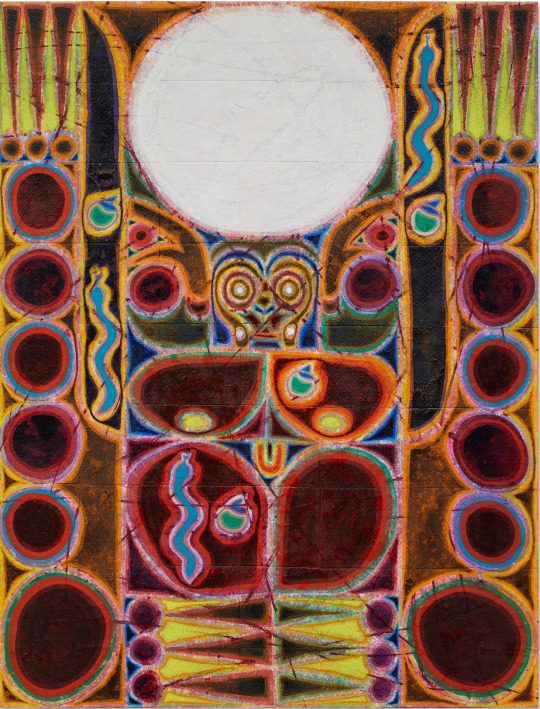
Alexander Tovborg (Danish, b. 1983) - Proverbs of Hell (the road of excess leads to the palace of wisdom) lucifer, acrylic, watercolor crayon, bronze leaf, felt and canvas collage on wooden panel, 170.8 x 128.8 cm (2016)
415 notes
·
View notes
Photo
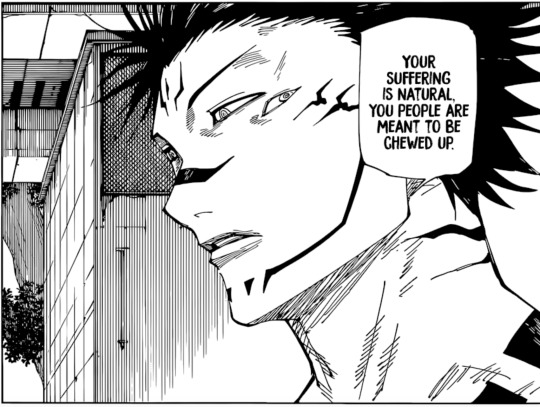
Chapter 214: Cursed Womb Under Heaven, part 6—Sukuna Sukuna Sukuna Sukuna Sukuna Sukuna Sukuna Sukuna Sukuna Sukuna Daddy Sukuna Sukuna Sukuna
Blessed / Cursed JJK-Sunday! Pick your poison...
I hate (affectionate) Sukuna because... well... this whole Megumi thing is so weird. Like... what is going on with the hair?
And yet I am a massive Sukuna simp (questionable) because... well.. this whole conversation with Yuji...
Like Sir. Yes, I will dedicate my life’s work to spreading the gospel of Sukuna to all who will listen. Ura Ume can cook, I can be your Marketing person and do your social media if that’s what you’re into.
I LOVE a character twisted by his own humanity. Yeeeessss...
More, please!
There’s more of me “yeeeeeeeeeesssss”+ing and promoting Sukunaism under the cut.
yeeeeeeeeeeeesssssss.....

The King of Curses
I am perhaps projecting, but there’s something definitively very regal about Sukuna and the way he carries himself in an embodied state.
I also loved that there is also something very benevolent about the look in Sukuna’s face as he speaks with Yuji about the nature of suffering for weaker beings.
Almost like “oh you poor thing, you really thought you were just going to be handed your cake and get to eat it too, didn’t you?”
And I am VERY consciously choosing to use the word benevolent to describe Sukuna because... there is something inherently twisted and yet, extremely real, in the message that Sukuna embodies.
Almost like he’s doing Yuji a favor by enlightening him on the root cause of his suffering.
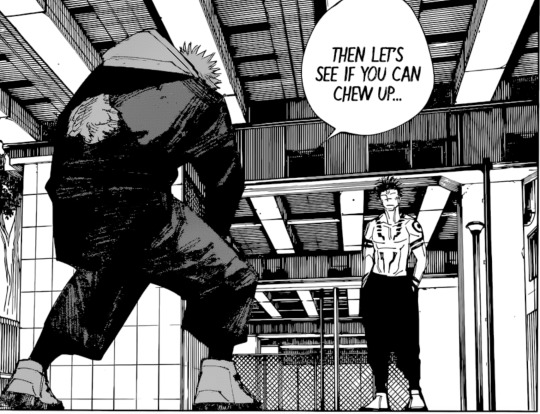
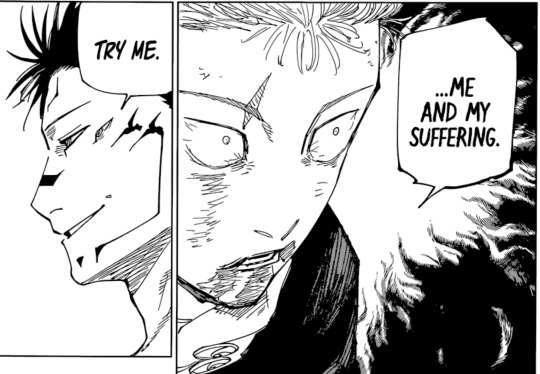
YES! yes yes yes yes yes yes yes yes yes YES!
Am I like a crazy person for loving Sukuna so much?
And there’s something so fascinating here about how, despite dropping deep truths about the human condition, Sukuna is literally the epitome of all that is cursed, a sort of container for all that is inherently wrong about humanity--to the point that you can’t even think of him as human, but rather, as inhuman.
But... really... what does it mean to be a human, what does it mean to be a curse, and where do we draw the line?


Are curses truly the sole source of suffering as Spooks asks?
After all... are curses not the result of negative human emotion?
Are we, as humans, not responsible for their existence?
You see, I became a cursed spirit apologist the moment Yuta kissed a cockroach. This forced me to start questioning what is good and what is evil.
The marriage of Heaven and Hell
Now... I am not asking for Sukuna to not be thought of as evil.
I am asking for a wider, more profound interpretation of evil. One that is not colored by the Western, white-washed, Judeo-Christian idea of the figure of Satan as a red horned creature that is evil for the sake of evil and makes people do evil #things.
I am asking for you to leave your pre-conceptions of evil at the door...
What if perhaps we saw Satan as Lucifer, the harbinger of light who was thrown out of Heaven for challenging the status quo and daring to seek enlightenment through embodiment?

What if we saw evil as as a corruption and degeneration of all that is good and humane--a sort of rejection of one expression of the self in favor of the trappings of self-gratification and self-identification?

What if we asked how Sukuna’s degenerated and corrupted humanity is an embracing and transcendence of suffering as not just inherent to the human condition, but a precursor of psychological and psychospiritual growth and development?

What if evil was a choice made in favor of the self and that is why Satan was cast out of Heaven?
What if evil was just trying to re-affirm the sense of self, and that is why Sukuna has chosen ego as his path of enlightenment?
After all...
“The road of excess leads to the palace of wisdom.”
When Gege introduced Jacob’s Ladder in chapter 213...
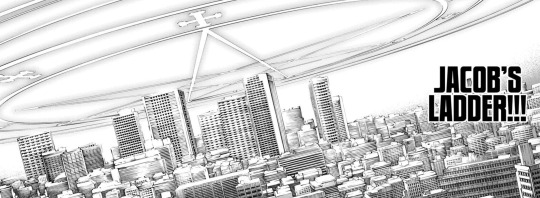
... he introduced one hell pun intended of a rabbit hole. One that I am not quite ready to talk about in great detail because I am unsure on how the symbols will be explored, or let’s be real here, whether they will get explored at all.
But with this tiny panel, Gege basically introduced the “upper” extreme of a metaphorical experience of psychospiritual growth depicted in the shape of a ladder. At the lower end of said ladder is the experience of descent into hell that is depicted in stories like Dante’s Divine Comedy.
Now. The interesting bit about Jacob’s Ladder getting mentioned, is that Gege added a neat little detail that is easy to miss unless you know what you’re looking for:

That is: Urizen’s Architect’s compass.

Now, for context, the painting above is a painting by William Blake, who perhaps not so coincidentally, also has a painting titled Jacob’s Ladder.
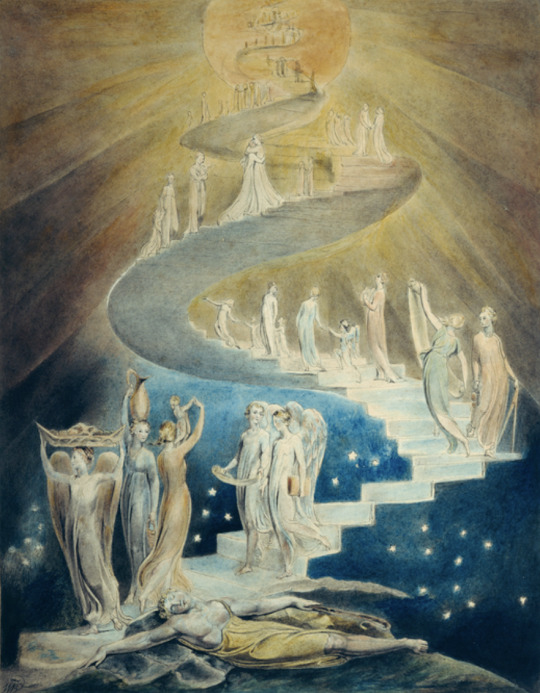
The painting is, indeed, inspired by the Biblical depiction of Jacob’s dream found in Genesis 28:10-17.
Again, the rabbit hole runs deep.
What I’ll say about this for now is that Gege might be using these symbols to present Sukuna as a character that personifies a sense of self that is beyond logic and reason where...
Good = logic bound by reason, and
Evil = imagination free from reason.
I still haven’t made up my mind about it because Gege is being a bit inconsistent with symbols, so we’ll have to wait to confirm.
But in a nutshell, this feels like a murky exploration of the sense of self and where it stands in relation to the question of “good and evil” or as Blake calls it “the marriage of Heaven and Hell”.
So if Gege is using William Blake’s philosophy then... I can’t help but see Sukuna as a character who has become enlightened through becoming entangled in the trappings of ego. Which is a nice dichotomy to how enlightenment is thought to be about transcending and leaving behind ego attachments.
But not Sukuna.
Sukuna is about experiencing the highest of highs and the lowest of lows of the human experience.
Logic be damned.
“The road of excess leads to the palace of wisdom”.
In other words, Sukuna strikes me as being about willingly and consciously embracing the suffering that is inherent to the human condition, and growing in strength because of it.
After all, you cannot know pleasure without first having known pain, and you cannot know pain if you have not known pleasure. In Blake’s words, "without contraries is no progression.”

Quick detour here to expand on these panels above... Explaining the sense of self is not easy.
What I can say right now is that the sense of self is the result of the ego-self negotiating with reality as it presents to you compared to your expectations and hopes for your reality.
In the words of Westworld’s Robert Ford:
"...the thing that led... to... awakening [is] suffering. The pain that the world is not as you want it to be.”
Similarly, Westworld’s Man in Black tells us that
“When you are suffering, that’s when you are most real.”
Which is another way of saying that there is strength and transformation to be found in suffering and that turning away from suffering is what weak minded people would do according to the gospel of Sukuna.
Or basically, when life hands you the lemons, you make margaritas with them although I highly recommend you use limes instead of lemons and might I also recommend Mezcal instead of Tequila for a nice smokey twist on everybody’s favorite Mexican cocktail.
Suffering is an inherent aspect of the human condition after all. You either develop the mental fortitude to keep moving forward, or, in Sukuna’s view, you remain weak, defeated by your fate.
And what’s interesting here is that Yuji has a very infantile unwillingness to see suffering as an inherent aspect of human existence.

Or as Spooks reminds us all, it’s not just curses that cause suffering.
So to me, Sukuna’s philosophy is about overwhelming strength as a result of self-gratification. He is the kind of character who will put himself through hell for the sake of acquiring strength.
This is where Jacob’s Ladder becomes relevant, because in Blake’s philosophy, the Angels who are “good”, could only see ego attachment (which is a metaphor for hell) as suffering. As such, they could not comprehend why anyone would put themselves through hell for the sake of self development.
In other words, Sukuna is an exploration on hedonism and all that can be considered sinful if only because the ego’s attachment to pleasure is at the root of suffering.
“The road of excess leads to the palace of wisdom”.
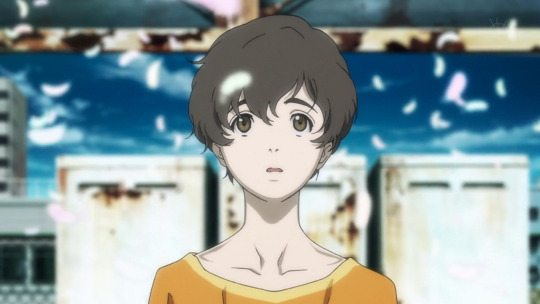
A different execution of this trope is another one of my blorbos, Twelve, from Watanabe’s Terror in Resonance (Zankyou no Terror).
Twelve is the kind of character who wants to have certain experiences and will, at the expense of his better judgment and other people, force certain experiences to happen just because he wants to have them. In fact, he doesn’t stop to think about consequences, he just acts for the sake of experiencing.
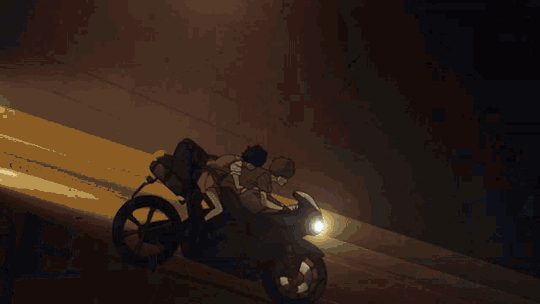
Whether these experiences cause pain and suffering or joy and happiness, does not matter. The point is to have the experience because the road of excess leads to the palace of wisdom.
For those of us who are crazy enough to be romantically inclined, it’s like the experience of falling in love while fearing rejection, but still choosing love.
Logic be damned.
But that’s just the thing, isn’t it? If you held back from the moments when you are invited to come alive every single time that you saw suffering in the horizon, would you cower from those experiences?
Or would you embrace them for the sake of self development?

Similarly, Sukuna who exists only for his own pleasure, is an example of how the ego is shaped and transformed through experience.
In Sukuna’s case, experience can come in the shape of fights and women and whatever will satiate the appetite of an ego hungry for embodied experience...
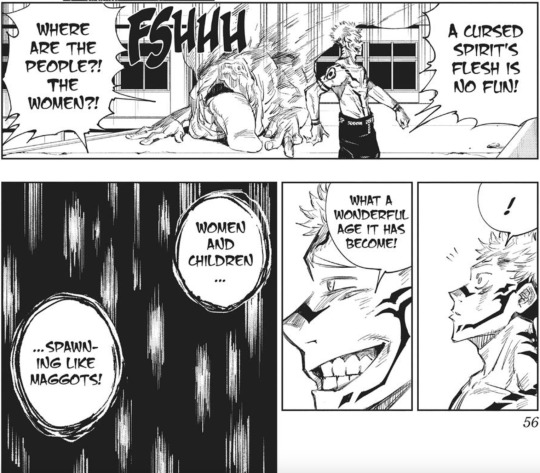
Hedonism, the pursuit of pleasure and sensual self-indulgence.
But I want to think that Sukuna also understands that you cannot forsake suffering, especially if you are in the pursuit of the better things that life has to offer.

There isn’t one without the other after all.
If you want to be happy, you have to be willing to suffer for that happiness.
You can’t know what wealth is unless you have known poverty.
You can’t know great love unless you have known heartbreak.
"Without Contraries is no progression.”
To reject this principle of human existence is, in Sukuna’s gospel, to be weak, to be prey to those who will consume anything and everything that is standing in the way of their hungry, insatiable ego.
God I love Jujutsu Kaisen...
Splat

Well, that was two *splat* moments in one month and I have to admit they are both just as brutal.

Anyways. This was an interesting chapter from a translator’s pov because there were subtle messages that may or may not have gotten lost in translation.
So just a heads up I kind of stuck to the fan translation for the most part for that very same reason.
Yuji and Megumi vs. Sukuna
Ok but to wrap things up...
I love that Sukuna is always impressed by Megumi...
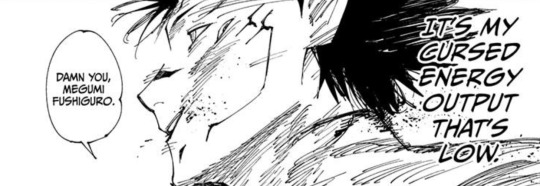
THAT’S MY BOY!!!!!!!! YEEEEEEEEEEEES!!!!
And I also love that Sukuna underestimates Yuji...
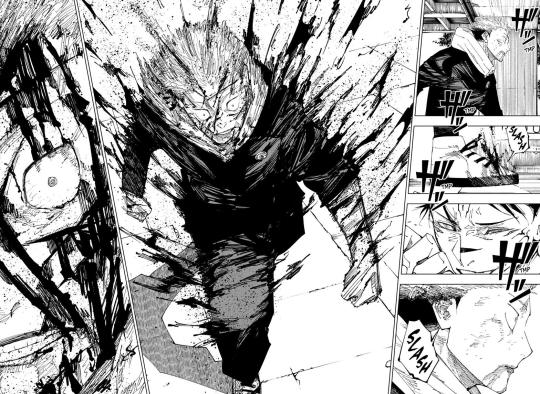
Yuji is by far one of my absolute favorite mcs in Shonen. He embodies the characteristics of your typical Shonen mc and then re-defines them in a way that is very uniquely Yuji.
Anyways, sigh of relief about Megumi. I can stop holding my breath FOR THE TIME BEING!!!!
It’s not that I don’t trust that Megumi has what it takes, the one I don’t trust is the cursed cat.
Can’t wait to see these two beautiful boys fight together.
Happy Jujutsu Kaisen Sunday and thank you for joining me again this week in this hell pun intended of a roller coaster.
72 notes
·
View notes
Text

The road of excess leads to the palace of wisdom.
#bnw greatshots#bnw captures#bnwphotography#bnw#bnw life#black and white photography#bnwmood#black and white#bnw city#palace#vietnam
100 notes
·
View notes
Text
“And because I am happy, and dance and sing, they think they have done me no injury.” [Chimney Sweeper]

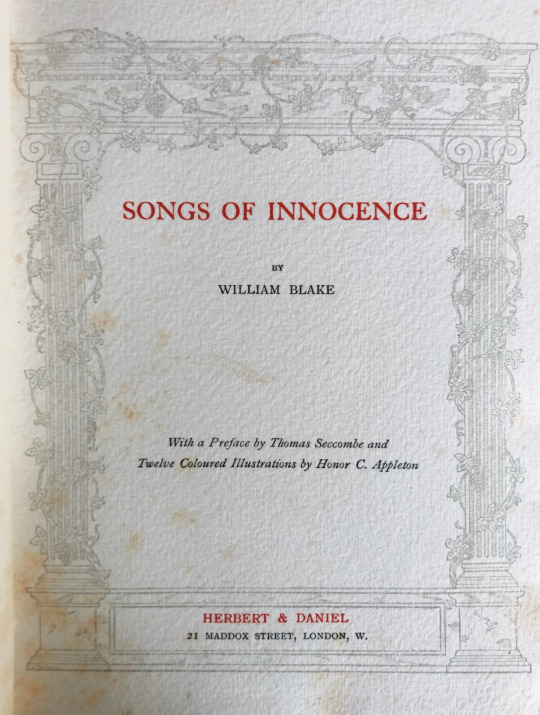


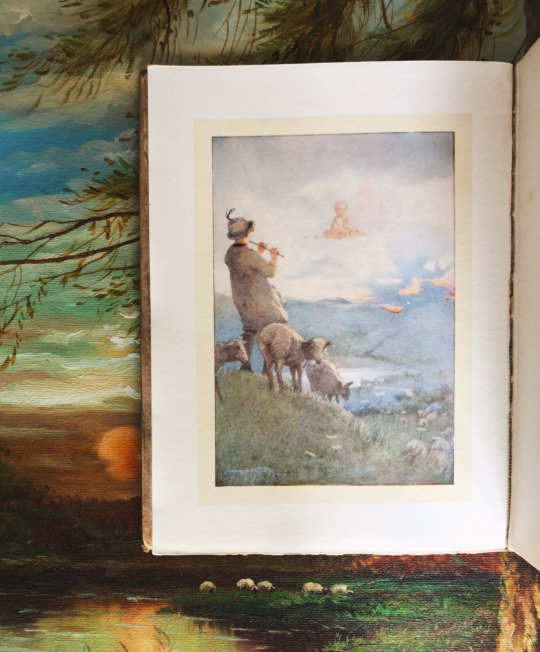



William Blake, a wonderfully exciting poet from the Romantic era, was born in London in 1757 into a working-class family with strong nonconformist religious beliefs.
Blakes believe and symbols are continously intervowen in his art. His poetic genius is trying to liberate the instinctual self and to defeat reason.
Blake's ethics formulates the originator of morality and religion through the process of liberation. Overcoming phenomenal objectness or fragmentation for the sake of a symbiotic unity of humanity within themselves and peaceful harmony of man with the world.
For every soul-wanderer, reading Blake is a spiritual gift and looking at his visualised art, a dive into cosmic seas of collective psychology.
Blake is breaking the lopsided emphasis of idealistic works. In all his gatherings of beauty, there is always a shadow of existential crisis. Even in the following work "Songs of Innocence",
the Fall off Paradise is already happening.
The violation of nature has begotten: The water is no longer clean and clear.
The eternal division of humanity from the divine cosmos as a complex interplay of an individual search for the Holy Grail, is the human idiosyncrasy.
The scepticism against rationalism and science is also playing a key role in Blake's work, as he underlines that only “The road of excess leads to the palace of wisdom.” [The Marriage of Heaven and Hell] and that "Art is the tree of life. Science is the tree of death."

Blake condemned the scientific trio of Isaac Newton, John Locke and Francis Bacon as sterile and materialistic. In this painting, (the idea of) Newton- sits on an algae covered rock, making calculations with a compass, like Urizen in Ancient of Days. He might be at the bottom of the sea, or perhaps in a black hole. He might be as Faust, signed a contract with the devil a few moments ago and then lose oneself in a cave, studying minerals and stones.
“The imagination is not a state: it is the human existence itself.”
The work "Songs of Innocence (and Experience)" is a double set of illustrated poems showing “the Two Contrary States of the Human Soul”, the child-like and pure versus the angry and disillusioned (cf. Jung's psychology and the meanings of symbols and archetypes- The shadow of the child is the senex, vice versa).
Here we also have dualistic concepts of questioning the being and the problem of theodicy: How could God tolerate the "evil" and why are bad things happening at all? If God is "the loving father" why are the humans deprived of their original goodness? Why is our world still torn between ferociousness of the few and the humble benign of the resisting ones?
Through the Fall of Man the unity between man and animal was broken (Gen. 3, 17 - 19), so the seperation is a result of the "evil", which was subsequently brought into the world.
An anthropological interpretation could be, that the "Fall of Man" or the "Original Sin" are narratives that memorize our cognitive faculty. First we had to be aware of ourselves and our environment, than we were able to distinguish between different kind of (living) beings.
The consciousness aroused questions about ethics, examining motives, motivations and shaping a guideline of virtues (Golden Rule).
But throughout the history of generating more insight- of metaphysical speculation and cosmogonic questioning of the creation of the world, it seems difficult to tell what we can really know and what are just guesses.
In modern times (but beginning with Xenophanes) the imago of God is excoriated as anthropomorphic.
But this statement shall not purport, that our human imagination is nothing less than an illusion and so less than nothing.
As Blake wisely interlinks our assumptions with the search for the first principle:
“He who sees the Infinite in all things sees God. He who sees the Ratio only sees himself only. Therefore God becomes as we are, that we may be as he is.”
Poets are the mediator dei, healing the earthly-borns from the abscence of spiritual healing. The humanity got more distrustful torwords ideals and the invisible world, but on the contrary, an individual, who always lacked deep philosophical wondering, is affected and enraptured easily through manipulative groups, who are just imitating religious sentiments, but without soul's salvation.
The search of the humankind is an eternal journey to it's cosmic roots, a balancing act between boon and bane, an entanglement of wisdom and folly: Theia Mania.
“In the universe there are things that are known and things that are unknown, and in between there are doors.”
There are some theories and perspectives dealing with the similarity between holiness and madness, found in all world religions. Mania can be the consequence of confrontation with the absolute and infinite, which is overwhelming the human reason and through overstraining, turning them mad. Mystic mania is one of my favourite motifs, it is the breath of prophecy and the ecstasy of poetizing the world of illusions, as a bridge to eternal ideas.
It is the idea of intensive love (to God and being), a radical self-denial for unification, a call for liberation.
Paradox pairs in Blakes works are continuously expanded,
"Without contraries is no progression. Attraction and repulsion, reason and energy, love and hate, are necessary to human existence."
Blake sets contrasts or he is breaking boundaries, either way he is creating and this energy of creating out of imagination, is considered by Blake as the "only life".
______________________________________________________________
Inspired by Blakes bucolic poetry and hints of a collapsing worlds, I was incited to write a small tribute with the most common motifs of the poetry in "Songs of Innocence".
The Active Evil and Passive Good by Elvin Karda
Dwelling in the arcadia
Pure daisies and cle the joyful life
Piping songs of pleasant glee
A child watches the piper
on a cload
"Pipe a song about a lamb-
Let those tones into the air
A reminiscence of a golden
land
Hidden treasures in ancient
sand!"
The piper plucks a hollow reed
fire tunes his inner song
and he stains the water clear
walking the rippling stream
along
In the evening dew
The joy is giving way to tears
When green shoots turn violet-
blue
Error is created and
eternal what is
true
The child's weeping
as meek as lamb
But vanishes and crumbles
into dust
As melody clothes the tone
in written words
Mind and body out of
touch
Energy is life and like a
fountain overflows
Active evil is better
than
told with bad intent
passive good
#1910#antiquarian book#world literature#19th century literature#literature#book cover#books#reading therapy#William Blake#romanticism#romantic epoch#romantic literature#poetry#poem#the poet#love as religion#holy mania#heaven and hell#cosmogonic questioning#theodicy#sense of life#between utopia and dystopia#original sin#theories of conscience
17 notes
·
View notes
Text
The road of excess leads to the palace of wisdom…You never know what is enough until you know what is more than enough.
― William Blake, Proverbs of Hell
#william blake#william blake quote#life#life quote#proverbs of hell#palace#wisdom#wisdom quote#excess#wise
9 notes
·
View notes
Text
4 наслови препорачува...
...Виктор Танасковски (музичар, поет)
Филм: „Paris, Texas“, Вим Вендерс
- Не знам дали можам и дали сакам да елаборирам премногу на оваа тема. Добро, објективните причини зашто е „Paris, Texas“ предобар веројатно им се јасни на сите што го гледале. Што се однесува до субјективните, можам само да кажам дека за мене овој филм значеше еден прекрасен пресврт, во секој аспект и во сите мои погледи на стварноста.
Книга: „Брак на рајот и пеколот”, Вилијам Блејк
- Како некој кој примарно се занимава со музика, до Блејк стигнав преку „Дорс“. Поточно, и до Блејк и до Хаксли истовремено; Како и да е, покасно овој процес се сврте и направи payback, па Блејк влијаеше на начинот на којшто правам и издавам музика, скоро секогаш у пакет со: слика и текст, и апсолутно секогаш „направи сам“. Ако разбивањето догми се земе како главна премиса на оваа книга, тогаш може да се каже и дека Блејк, како еден прото-мултимедијален и самиздат чудак е и првиот анти-индустријалец и панкер у историјата на уметноста кој поставува „блупринт“ за DIY култура. Фала Блејк, ваљда стварно „the road of excess leads to the palace of wisdom”, ти би знаел.
Плоча: “Discipline”, King Crimson
Увек највише ме допираат дела коишто ми отвораат уште еден куп ствари за „further reading” (и listening). Тешко ми е да издвојам само еден нивен албум, зашто практично на секој нареден звучат како нов бенд, али за мене конкретно „Discipline“ е посебно битен како мост помеѓу сите музики што ги сакам. Додека со деби албумот од 1969-та Кримсон земаат све што може од сета музика дотогаш, и од тоа прават новина наречена прог-рок, во 1981, кога целото прог-рок движење ја губи смислата и се фаќа себеси во стапицата на сопствените клишеа, албумов го реобмислува жанрот from scratch, па од бајатиот прог-рок одново прави... музика. Уз пут, предвидува уште неколку жанрови што допрва ќе бидат измислени. Уште поважно, слушајќи го „Discipline“, можам целосно да се изолирам и да ги занемарам сите техничко-математички решенија со кои изобилува и само да го слушам, чисто, без да размислувам за целата мајсторија, туку само да ја осеќам сировата емоција позади оваа музика, која е моќна до таа мера, што самата интелектуална позадина и технички перфектна комплексност стануваат апсолутно небитни.
Ликовно дело: „Невестата соблечена гол�� од нејзините младоженци, дури”, Марсел Дишан
- Она што многу го сакам кај Дишан е фактот што, додека со сите свои дела му пркоси и му противречи на академизмот, догматизмот (пак), клишеата (пак), ми се чини како овде да си противречи и на самиот себе. Делово, сакал или не, и те како е „retinal“ и „pleasing to the eye”. Освен тоа, на сличен начин како „Discipline“, толку е вешто сработено што точно таа прецизност овозможува да биде посматрано без препреки, баш пошто е доведено до некое совршенство на играње со: деталите, перспективата и геометријата, што нема ништо што „смета“, па дозволува да биде перципирано „чисто“, со фокус само на неговата суштина и значење. А за да е уште попарадоксално, можно е и воопшто да нема ниту посебна суштина ниту значење. А можно е и да кажува нешто во врска со некакви односи на моќ, или макро-микрокосмички (дис)баланс, или нешто трето. Не знам, затоа и толку ми се свиѓа.
2 notes
·
View notes
Text
"a morbid longing for the picturesque at all costs"
ok, Richard's big, phat hamartia: lets get into it.
"The road of excess leads to the palace of wisdom... You never know what is enough until you know what is more than enough."
– William Blake (via. Party Monster (2003))
"Beauty is terror" is the point of the book. Richard is constantly getting tricked and tripped up by his desperate need to find beauty, and it's what drags him down in the end. This flaw is introduced to us right at the beginning almost like a signpost going "look out for this!!!"
I personally love that it's right there. Rich as an unreliable narrator is hilarious because he's a very honest liar. He will tell us to our face "i'm a liar, i like beautiful things, and i hate being poor" and then he will just go out and do that. Just go bonkers.
The morbidity of his longing of course extends to murder, but its also very self-destructive. He confuses substance for style, and only sees worth in what is beautiful (even if that worth is not there). There's scenes later where he meets Judy Poovey and attends parties outside of the Classics gang, and everything points to those people fitting Richard far more--they have shared experiences with him, they are not snobs, and they have what he wants (riches, coolitude, not murder). If he just sticks with them, he will be happy and have rich friends who actually like him without him having to lie to them, but he cannot see this because they don't match his aesthetic. His morbid longing poisons him and lands him in a cult.
He does have moments of doubt, his warning bells go off (like when he briefly regrets dropping all his classes to join the Classics) but he shrugs them off because the Classics are beautiful.
there's a lot more to explore with the theme of Beauty in TSH but i'll leave it here for now
8 notes
·
View notes
Text

The road of excess leads to the palace of wisdom.
72 notes
·
View notes
Text
Blake

“THE ROAD OF EXCESS LEADS TO THE PALACE OF WISDOM"
~ William Blake (poet, painter, printer, visionary)
HAPPY BIRTHDAY!! (11/28/1757) [Thanks Keyvan Golestaneh]
* * * *
Cruelty has a Human Heart
And Jealousy a Human Face
Terror the Human Form Divine
And Secrecy, the Human Dress
—William Blake, who was born #OnThisDay in 1757.
[Nov 28]
6 notes
·
View notes
Link
Check out this listing I just added to my Poshmark closet: The road of excess leads to the palace of wisdom 𖦹.
0 notes
Text
Good Omens Fic / Ficlet Prompts
William Blake’s “Proverbs of Hell”, part of his mad and delightful The Marriage of Heaven and Hell, contains sixty-nine sayings. (All together now: nice!) The more I read them, the more I think they would be perfect prompts for Good Omens fic / ficlets, so here they are in the hopes that others might see and enjoy.
In seed-time learn, in harvest teach, in winter enjoy.
Drive your cart and your plough over the bones of the dead.
The road of excess leads to the palace of wisdom.
Prudence is a rich ugly old maid courted by Incapacity.
He who desires, but acts not, breeds pestilence.
The cut worm forgives the plough.
Dip him in the river who loves water.
A fool sees not the same tree that a wise man sees.
He whose face gives no light shall never become a star.
Eternity is in love with the productions of time.
The busy bee has no time for sorrow.
The hours of folly are measured by the clock, but of wisdom no clock can measure.
All wholesome food is caught without a net or a trap.
Bring out number, weight, and measure in a year of dearth.
No bird soars too high if he soars with his own wings.
A dead body revenges not injuries.
The most sublime act is to set another before you.
If the fool would persist in his folly he would become wise.
Folly is the cloak of knavery.
Shame is Pride’s cloak.
Prisons are built with stones of law, brothels with bricks of religion.
The pride of the peacock is the glory of God.
The lust of the goat is the bounty of God.
The wrath of the lion is the wisdom of God.
The nakedness of woman is the work of God.
Excess of sorrow laughs, excess of joy weeps.
The roaring of lions, the howling of wolves, the raging of the stormy sea, and the destructive sword, are portions of Eternity too great for the eye of man.
The fox condemns the trap, not himself.
Joys impregnate, sorrows bring forth.
Let man wear the fell of the lion, woman the fleece of the sheep.
The bird a nest, the spider a web, man friendship.
The selfish smiling fool and the sullen frowning fool shall be both thought wise that they may be a rod.
What is now proved was once only imagined.
The rat, the mouse, the fox, the rabbit watch the roots; the lion, the tiger, the horse, the elephant watch the fruits.
The cistern contains, the fountain overflows.
One thought fills immensity.
Always be ready to speak your mind, and a base man will avoid you.
Everything possible to be believed is an image of truth.
The eagle never lost so much time as when he submitted to learn of the crow.
The fox provides for himself, but God provides for the lion.
Think in the morning, act in the noon, eat in the evening, sleep in the night.
He who has suffered you to impose on him knows you.
As the plough follows words, so God rewards prayers.
The tigers of wrath are wiser than the horses of instruction.
Expect poison from the standing water.
You never know what is enough unless you know what is more than enough.
Listen to the fool’s reproach; it is a kingly title.
The eyes of fire, the nostrils of air, the mouth of water, the beard of earth.
The weak in courage is strong in cunning.
The apple tree never asks the beech how he shall grow, nor the lion the horse how he shall take his prey.
The thankful receiver bears a plentiful harvest.
If others had not been foolish we should have been so.
The soul of sweet delight can never be defiled.
When thou seest an eagle, thou seest a portion of Genius. Lift up thy head!
As the caterpillar chooses the fairest leaves to lay her eggs on, so the priest lays his curse on the fairest joys.
To create a little flower is the labour of ages.
Damn braces; bless relaxes.
The best wine is the oldest, the best water the newest.
Prayers plough not; praises reap not; joys laugh not; sorrows weep not.
The head Sublime, the heart Pathos, the genitals Beauty, the hands and feet Proportion.
As the air to a bird, or the sea to a fish, so is contempt to the contemptible.
The crow wished everything was black; the owl that everything was white.
Exuberance is Beauty.
If the lion was advised by the fox, he would be cunning.
Improvement makes straight roads, but the crooked roads without Improvement are roads of Genius.
Sooner murder an infant in its cradle than nurse unacted desires.
Where man is not, nature is barren.
Truth can never be told so as to be understood and not to be believed.
Enough! or Too much.
If you do end up inspired by any of these, please tag me? I'd love to see what you come up with!
#good omens#crowley#aziraphale#good omens fanfiction#fanfiction prompts#william blake#the marriage of heaven and hell#proverbs of hell
1 note
·
View note
Text
The road of excess leads to the palace of wisdom =

= double open heart.
#Twelve#terror in resonance#zankyou no terror#character archetypes#your honor I love him#he's defo blorbo approved
29 notes
·
View notes
Text
<p>So I’m using <code>abc</code> as a hostname because of course the TLD is <code>.xyz</code> so of course, but also I want to make this the “sidecar” to the main show that goes on over at starrwulfe.xyz. With that in mind, should I be making categories for “kinds” that you see in some other blogs?</p> <ul> <li> <p>namely the <a href="https://starrwulfe.xyz/kind/read/">Reads</a>, <a href="https://starrwulfe.xyz/kind/video/">Watches</a> and <a href="https://starrwulfe.xyz/kind/audio/">Listens</a> activities for stuff I’m doing… I think I need to rework how that was done over there and make it more succinct.</p> </li> <li> <p>Then there’s the <a href="https://starrwulfe.xyz/kind/notes">notes</a> <a href="https://starrwulfe.xyz/notes">sections</a>. Which acts like a catch-all for random short posts with no title… Conversations into the either.</p> </li> <li> <p>Also the <a href="https://starrwulfe.xyz/likes/">Like</a>, <a href="https://starrwulfe.xyz/kind/bookmark/">Bookmarks</a>, and <a href="https://starrwulfe.xyz/kind/reply/">Replies</a> <a href="https://starrwulfe.xyz/replied">sections</a> that’s especially part of the efforts of POSSEing up all the comments and content from around the internet back here.</p> </li> </ul> <p>Also bear in mind the communications features are in both places for first-party integration into the Fediverse; the main one at <code>@[email protected]</code> and running ActivityPub for Wordpress and this one here <code>@[email protected]</code> on micro.blog. So I’ve got double vision.</p> <blockquote> <p>“The road of excess leads to the palace of wisdom.” ― William Blake, The Marriage of Heaven and Hell</p> </blockquote> <p>Should I bottle all that up and bring it over here while leaving the “main blog” to host articles, long form content and the like? (Certainly, I need to give it a better coat of paint in the form of themeing; I never got around to actually doing that part as I want to work on the plumbing first…</p> <p>…Dammit, I don’t even have my categories set for where <em>this</em> post is going to wind up! 🤦🏾♂️</p>
0 notes
Quote
The road of excess leads to the palace of wisdom.
William Blake
#William Blake#Wisdom#quotes#life#love#important#tumblr#instagood#aesthetic#girl#literature#sad quotes#sad poem#zitate
1 note
·
View note
Video
youtube
“You never know what is enough
unless you know what is more than enough.
The lust of the goat is the bounty of God.
The road of excess leads to the palace of wisdom.”
0 notes